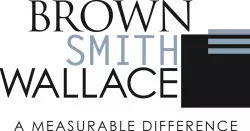When dealing with sales and use tax, knowing what you need is half the battle. In this month's "Financial Fitness," Karen Stern, partner in charge of the Brown Smith Wallace Entrepreneurial Services Group, discusses some of the basics to keep your business compliant, as featured in Small Business Monthly.
As a small-business owner, it's important to be aware of your sales tax obligations. Whether you're collecting, calculating, reporting or paying sales tax, it can be easy to get overwhelmed with sales tax compliance. Here are some tips on what you should know in regard to sales and use tax:
- What is the difference between sales tax and use tax? Rates vary depending on the tax type, as does the burden of collection.
- Which business activities create nexus? This
is especially important for businesses that do work or solicit
sales across state lines. A business should discuss any changes in
its operations with its tax professionals to ensure the business
has not triggered nexus in any additional states. The following
types of physical presence may create sales/use tax nexus in a
state:
- Property
- Employees
- Independent contractors/agents
- Affiliates
- Agents
- What is a taxable transaction? It is important to understand the types of transactions that are subject to tax in each state so a business can ensure compliance in every relevant state. Each state's rules regarding sales/use tax will vary.
- Which exemptions does my state offer? It is important to understand the different types of exemptions each state offers, for both sales and purchases by the business.
Originally published January 2015
The content of this article is intended to provide a general guide to the subject matter. Specialist advice should be sought about your specific circumstances.

